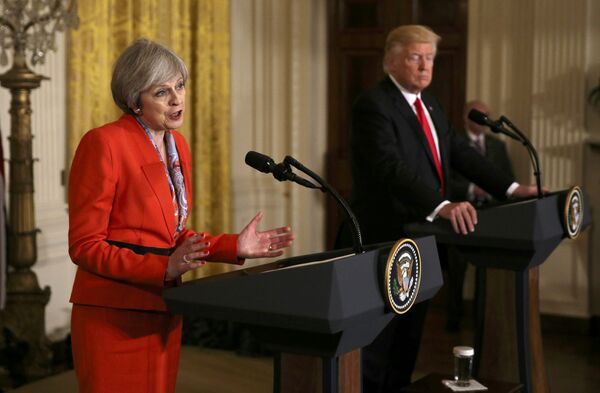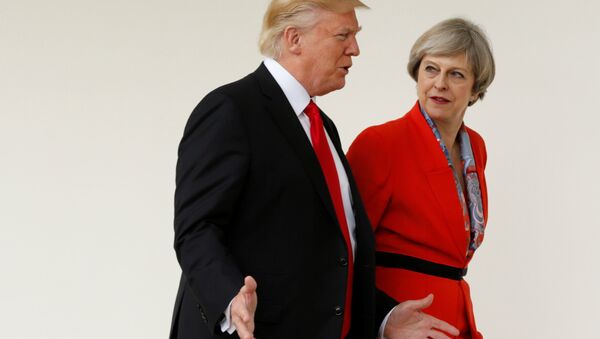UK Foreign Secretary Boris Johnson confirmed on January 30 that the consequences of Trump's executive order to block entry to the United States for nationals of seven Muslim-majority countries, will not have an impact on British citizens and dual nationals.
We will protect the rights and freedoms of UK nationals home and abroad. Divisive and wrong to stigmatise because of nationality
— Boris Johnson (@BorisJohnson) January 29, 2017
Statement on what the Presidential exec order on inbound migration to US means to Brit nationals/dual nationals. https://t.co/1vpjcXbZBg
— Boris Johnson (@BorisJohnson) January 29, 2017
However, Johnson was unable to clarify what would happen to the thousands of British nationals who do not have a British passport, reside in the UK, but where born in one of the seven countries impacted by Trump's order. The Foreign Secretary said that the policy was wrong as it set a divisive tone and it was targeted at certain racial groups, however reaffirmed the strong alliance that the UK has with the US.
This is a highly controversial policy that has caused unease and it is not an approach that this government will take. However, let me conclude that we remind the House of the vital importance of this country's alliance with the US. Our national defense and security work together is closer than that of any other country in the world," Johnson said in a parliamentary address to the House of Commons.

A source close to the UK Prime Minister Theresa May has told the BBC, that canceling the trip would be a "populist gesture" and it would "undo everything" achieved by the PM in her trip to the US last week.
As a result of the online petition gaining so much support, Trump's state visit to the UK is expected to be debated in Parliament after senior Conservatives joined hundreds of thousands calling for it to be canceled.
By signing, you become part of a peaceful resistance against a man attacking human rights. What an opportunity… https://t.co/En4HJE2J7q
— Will Poulter (@PoulterWill) 30 January 2017
@MayorofLondon Thank you for saying this. Your leadership is inspiring. Hope you make it to the London protest tonight. #NoBanNoWall #Resist
— Eric Stoller (@EricStoller) January 30, 2017
We should not be honouring President Trump with a State visit and he certainly should not be invited to address both Houses of Parliament.
— Chuka Umunna (@ChukaUmunna) January 30, 2017
However, the likelihood that this visit will be stopped is slim due, so it brings up the question of how useful and beneficial online petitions actually are.
After the EU referendum in the UK, hundreds of thousands of people signed an online petition calling for Britain not to leave the EU. Although the petition was acknowledged by the UK government, Brexit is still going to take place.
Thick UK leftists trying to use a useless internet petition to stop the most powerful man on the planet visiting the Queen. #Trump.
— Brexit UK 🇬🇧🇺🇸 (@Brexiteer_UK) January 29, 2017
Shehab Khan, a political journalist, said that we shouldn't completely write-off the use of petitions as a strong democratic tool.
"We have to look at it as a fantastic way for people to get involved in the democratic process and voice their opinions. It helps people get involved. About a million people have signed it and Theresa May will be made aware of this and that's what's important," Mr. Khan told Sputnik.
Over one million people have signed the petition against Trump's state visit — you can add yours here: https://t.co/kEWvP1k2lo
— Owen Jones (@OwenJones84) 30 January 2017
However, Mr. Khan also agrees that the likelihood the state meeting, where the US president is expected to meet HRH the Queen will be canceled, is an unlikely encounter and will not happen.
"I think it's unlikely that Mrs. May will cancel the meeting, but what I think this does indicate is that the people are not happy about Trump's visit and that's what's important here," Mr. Khan said.
When an online petition gets 10,000 signatures, the government has to respond. At 100,000 signatures, a petition will be considered for a debate in Parliament. But if the petition, similar to the one done for Brexit, will not create change, many wonder — what is the point?
Regardless of whether the Brexit petition was successful or not, it should not stop people from using this avenue to get issues heard in parliament, Mr. Khan believes:
"The Brexit petition was different, people voted to leave the EU. However with this petition, it's about people voicing how unhappy they are with Trump and his current policy. I think Trump will deal with the UK petition in the way he dealt with everything else, he will laugh it off and he won't comment unless it gets bigger," Mr. Khan told Sputnik.


